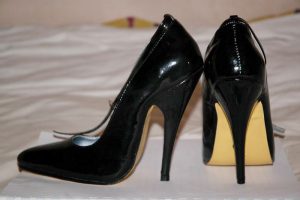No, No, Manolo! Stick To Shoes!
Manolo Blahnik wonders, 'Can you still compliment women at work, or could that be considered sexual harassment?'
 Not until recently did I know that Manolo Blahnik was the shoe king. Somewhere in the recesses of my mind, the few times that I heard his name I confused him with Manute Bol, the 7-foot, 7- inch, 225-pound NBA star. I know — pretty sad.
Not until recently did I know that Manolo Blahnik was the shoe king. Somewhere in the recesses of my mind, the few times that I heard his name I confused him with Manute Bol, the 7-foot, 7- inch, 225-pound NBA star. I know — pretty sad.
But I think I know the workplace pretty well, and when I happened to read an interview with him recently, I learned to my utter surprise that he never played professional basketball (and likely has never been over 7 feet tall — even in his highest shoes). But he shared an increasingly common workplace concern: can I still compliment women at work, or could that be considered sexual harassment?
I Cannot Say “How Wonderful You Look”

Is The Future Of Law Distributed? Lessons From The Tech Adoption Curve
Apparently, the famed shoe designer told an interviewer “about how he struggles with knowing what he can say … ‘I cannot say, ‘How wonderful you look.’ I cannot pay compliments … because maybe it can be called sexual harassment.’”
He said that “he was ‘given a list of things he cannot say to people’ for fear of crossing a line.” But he noted that “the list was not given to him specifically, adding ‘somebody gave it to everybody.’”
Whatever that means.
Manolo Blahnik — You Are Not Alone!
Sponsored

The Business Case For AI At Your Law Firm


Legal AI: 3 Steps Law Firms Should Take Now

Navigating Financial Success by Avoiding Common Pitfalls and Maximizing Firm Performance

Navigating Financial Success by Avoiding Common Pitfalls and Maximizing Firm Performance
I posted a piece here a year ago called, “Sexual Jokes and Banter At The Water Cooler: Not Cool At All!” The general takeaway was that
We all like to joke, tease, prank, and – face it – it sometimes gets a bit out of control, and the language gets a little “salty.” All in good fun, in the right place and context. But not in the workplace. Even by the water cooler.
“A Compliment Is Not A Simple Thing”
I spent a lot of time in that post discussing compliments or casual remarks made in the workplace, such as, “Hey, I like your dress,” or, “You look like you’ve been working out,” and asked whether this could be considered sexual harassment, and if one such comment is taboo – “or does it become taboo if done repeatedly?”
A compliment is not a simple thing; think about what a compliment may be seen as or used for in the workplace, which is typically male-dominated. It may be meant as an innocent remark, or it may reflect the power differential between two people. Not so simple.
Sponsored

Is The Future Of Law Distributed? Lessons From The Tech Adoption Curve

Early Adopters Of Legal AI Gaining Competitive Edge In Marketplace
A lot of things have changed since that last post, and Manolo is, indeed, not alone. The #MeToo movement, the number of well-known and powerful male executives, celebrities, and politicians brought down by allegations of sexual harassment, and the rising power of women in politics and business. Has all of this changed the nature of workplace compliments and is Manolo right to be concerned?
“You Know Nothing About What Others Experience Unless You Have Experienced It”
Last November, I posted a three-part dialogue with my D.C. employment partner, Amy Epstein Gluck (affectionately known, at least to me, as “the Notorious AEG”), in which I had her comment on what I thought was a thoughtful post that I had previously posted on tips to avoid being a workplace harasser. The dialogue with Amy taught me a lot. My own takeaway from it was that no matter how much you think you are enlightened, progressive and diversity-minded, you know nothing about what others experience unless you have experienced it.
For example, I had previously posted as a “tip” the break-out quote above that “a compliment is not a simple thing,” and concluded after careful (I thought) analysis that as to workplace compliments, “Don’t do it. The stakes are too high!”
That goes for you too, Manolo!
“They Should Consider How It Might Sound To A Woman”
But wait!
Amy rightfully took me to task for this conclusion, and since I know that Manolo likely reads this blog, and Amy likely wears — or wants to wear — Manolos (sorry, Amy — have I really learned nothing??) her full comment from that dialogue is my answer to poor Manolo:
I think the issue with compliments is more like saying, “I like your top” when a woman is displaying even a hint of cleavage. Or saying, “Wow, you look good” or something similar while looking a woman up and down or at a specific body part so that it’s obvious you’re checking out her body.
Also, though there’s nothing wrong with looking a woman in the eye and saying she looks nice, I think what you may have meant to say is don’t give compliments or comment about a woman’s appearance. Especially if you wouldn’t say the same — in words or by non-verbal cues — to a male colleague.
After all, you compliment me all the time — great post, good work, excellent piece, etc., and that’s not sexual harassment. Consider qualifying your no compliments rule and perhaps put it like this: Men should check themselves before they speak or act around women, perhaps asking themselves, “How would I feel if my wife’s male colleague spoke or acted this way to her?”
They should consider how it might sound to a woman.
Takeaway
Well, there is no bright line, and the words, content, and tone used, as well as facial expressions and posture, must all be taken in context. As in life. “Consider how it might sound to a woman.”
So, to Manolo (and to all of us who share his concerns), I say: Sorry, Manolo — life is hard indeed. Better stick to shoes — unless you listen to Amy, leave the compliments to others.
 Richard B. Cohen has litigated and arbitrated complex business and employment disputes for almost 40 years, and is a partner in the NYC office of the national “cloud” law firm FisherBroyles. He is the creator and author of his firm’s Employment Discrimination blog, and received an award from the American Bar Association for his blog posts. You can reach him at Richard.Cohen@fisherbroyles.com and follow him on Twitter at @richard09535496.
Richard B. Cohen has litigated and arbitrated complex business and employment disputes for almost 40 years, and is a partner in the NYC office of the national “cloud” law firm FisherBroyles. He is the creator and author of his firm’s Employment Discrimination blog, and received an award from the American Bar Association for his blog posts. You can reach him at Richard.Cohen@fisherbroyles.com and follow him on Twitter at @richard09535496.







